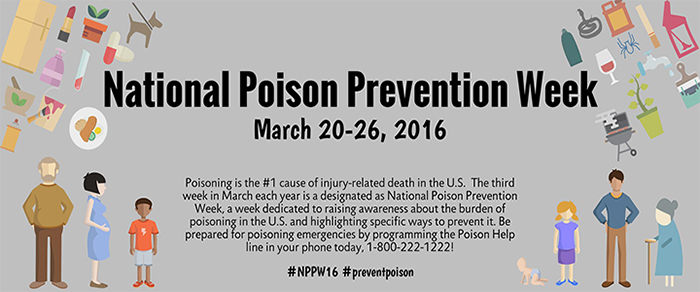MARYLAND POISON CENTER CELEBRATES NATIONAL POISON PREVENTION WEEK
Written By: Angel Bivens, RPh, MBA, CSPI, MPC’s Public Education Coordinator
Each year, thousands of children and adults in Maryland experience potentially toxic exposures to everyday items including, but not limited to:
- Medicines
- Insect sprays
- Bites and stings
- Cleaners
- Plants
- Garden products
- Car products
- Personal care products
From March 20-26, the Maryland Poison Center (MPC) — along with other poison centers across the United States — will celebrate National Poison Prevention Week (NPPW) to help raise awareness about the dangers of poisonings and educate families about the steps that they can take to prevent them.
Poison Experts Are Just a Phone Call Away
According to the Centers for Disease Control and Prevention (CDC), poisoning is the number one cause of injury death in the United States. If a poisoning or overdose has occurred, there is no time to waste. Call the MPC at 1-800-222-1222 to speak with a pharmacist or nurse who is certified as a specialist in poison information. These experts are available 24 hours a day, 7 days a week to provide free, fast, and confidential advice about poisonings and overdoses. In fact, more than 65 percent of cases reported to the MPC are able to be safely managed at home, which helps families avoid an expensive visit to the local hospital.
Prevention Is the Best Medicine
Although many of the calls received by the MPC involve children younger than six years old, it is important to remember that teens, adults, and seniors are also at risk for poisoning. To help prevent poisonings in your home, the MPC offers the following helpful advice:
- Read and follow directions on the label before using medicines and household products.
- Follow the Poison Safety Checklist to make sure all medicines, poisons, and harmful household products are stored out of the sight and reach of children.
- Keep all household products and medicines in their original containers. Never put chemicals or cleaning products in empty food or drink containers.
- Always ask for medicine in child-resistant containers, but remember that these containers are not child-proof. If given enough time, children can often open the safety caps.
- Know the names of plants in and around your home, and remove poisonous ones from the house and yard.
- Teach small children never to touch or taste something unless they ask an adult.
- Put medicines away after each dose, even if they will be taken again in a few hours.
- Have a carbon monoxide alarm in your home if you have a fireplace, wood burning stove, or other gas appliances.
Get Started Now! Make Your Home Poison Safe
Download the MPC’s poison proofing checklist and follow the steps listed to help keep you and your family safe from potential poisonings. Families in the state of Maryland who would like more information about poison prevention are also invited to request a Mr. Yuk packet for their homes. This packet contains information about poison safety that can help families prevent or prepare for poisoning emergencies. Individuals living outside of Maryland can visit the American Association of Poison Control Centers to find their local poison center.

